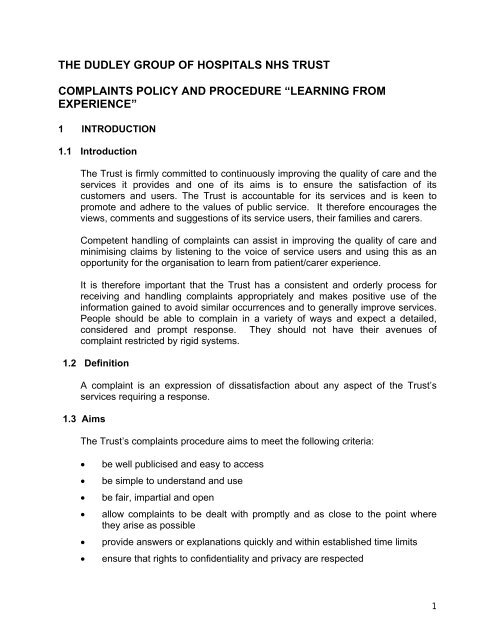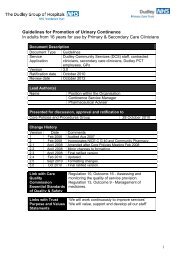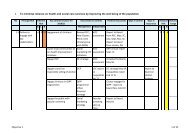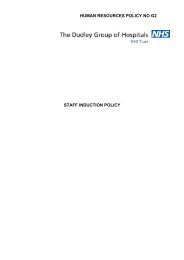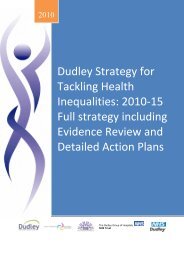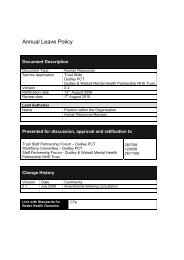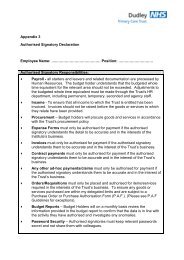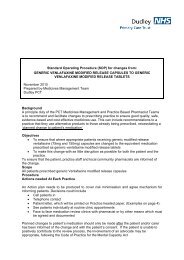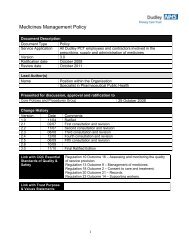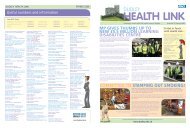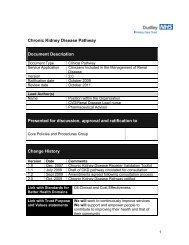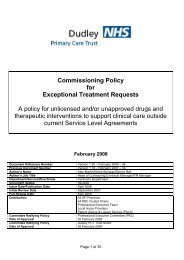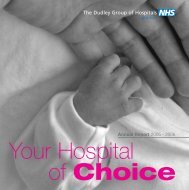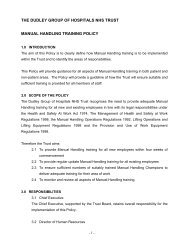the dudley group of hospitals nhs trust complaints policy and ...
the dudley group of hospitals nhs trust complaints policy and ...
the dudley group of hospitals nhs trust complaints policy and ...
You also want an ePaper? Increase the reach of your titles
YUMPU automatically turns print PDFs into web optimized ePapers that Google loves.
THE DUDLEY GROUP OF HOSPITALS NHS TRUSTCOMPLAINTS POLICY AND PROCEDURE “LEARNING FROMEXPERIENCE”1 INTRODUCTION1.1 IntroductionThe Trust is firmly committed to continuously improving <strong>the</strong> quality <strong>of</strong> care <strong>and</strong> <strong>the</strong>services it provides <strong>and</strong> one <strong>of</strong> its aims is to ensure <strong>the</strong> satisfaction <strong>of</strong> itscustomers <strong>and</strong> users. The Trust is accountable for its services <strong>and</strong> is keen topromote <strong>and</strong> adhere to <strong>the</strong> values <strong>of</strong> public service. It <strong>the</strong>refore encourages <strong>the</strong>views, comments <strong>and</strong> suggestions <strong>of</strong> its service users, <strong>the</strong>ir families <strong>and</strong> carers.Competent h<strong>and</strong>ling <strong>of</strong> <strong>complaints</strong> can assist in improving <strong>the</strong> quality <strong>of</strong> care <strong>and</strong>minimising claims by listening to <strong>the</strong> voice <strong>of</strong> service users <strong>and</strong> using this as anopportunity for <strong>the</strong> organisation to learn from patient/carer experience.It is <strong>the</strong>refore important that <strong>the</strong> Trust has a consistent <strong>and</strong> orderly process forreceiving <strong>and</strong> h<strong>and</strong>ling <strong>complaints</strong> appropriately <strong>and</strong> makes positive use <strong>of</strong> <strong>the</strong>information gained to avoid similar occurrences <strong>and</strong> to generally improve services.People should be able to complain in a variety <strong>of</strong> ways <strong>and</strong> expect a detailed,considered <strong>and</strong> prompt response. They should not have <strong>the</strong>ir avenues <strong>of</strong>complaint restricted by rigid systems.1.2 DefinitionA complaint is an expression <strong>of</strong> dissatisfaction about any aspect <strong>of</strong> <strong>the</strong> Trust’sservices requiring a response.1.3 AimsThe Trust’s <strong>complaints</strong> procedure aims to meet <strong>the</strong> following criteria:• be well publicised <strong>and</strong> easy to access• be simple to underst<strong>and</strong> <strong>and</strong> use• be fair, impartial <strong>and</strong> open• allow <strong>complaints</strong> to be dealt with promptly <strong>and</strong> as close to <strong>the</strong> point where<strong>the</strong>y arise as possible• provide answers or explanations quickly <strong>and</strong> within established time limits• ensure that rights to confidentiality <strong>and</strong> privacy are respected1
• provide a thorough <strong>and</strong> effective mechanism for resolving <strong>complaints</strong> <strong>and</strong>also matters <strong>of</strong> concern• enable lessons learned to be used to improve <strong>the</strong> quality <strong>of</strong> services• be regularly reviewed <strong>and</strong> amended if found to be lacking in any respect• be consistent with national guidance.• provide <strong>the</strong> essential information for <strong>complaints</strong> reporting, eg. Copy <strong>of</strong><strong>complaints</strong> procedure to complainant (containing information regardingassistance from ICAS-POhWER), details <strong>of</strong> response times, etc.• ensure complainants are treated courteously <strong>and</strong> sympa<strong>the</strong>tically2 POLICY2.1 General PrinciplesIt is important that <strong>the</strong> correct procedures are followed <strong>and</strong> that <strong>the</strong> contents <strong>of</strong> thisdocument are brought to <strong>the</strong> attention <strong>of</strong> all staff who are likely to receive<strong>complaints</strong> <strong>and</strong> patients/carers who wish to express <strong>the</strong>ir dissatisfaction.Complaints will be viewed in a positive way by using <strong>the</strong>m to identify what serviceimprovements should occur. Health Service Providers have a responsibility to doall that is possible to reduce <strong>the</strong> need for <strong>complaints</strong> by patients, <strong>the</strong>ir relatives <strong>and</strong>advocates.The Trust will act in accordance with <strong>the</strong> legal directions <strong>of</strong> <strong>the</strong> National HealthService (Complaints) Regulations 2004 <strong>and</strong> <strong>the</strong> National Health Service(Complaints) Amendment Regulations 2006.The Business Support Manager (Complaints) is <strong>the</strong> <strong>of</strong>ficer responsible foradministrative co-ordination <strong>and</strong> for ensuring that <strong>complaints</strong> are actioned in linewith <strong>the</strong> guidance. He/she will investigate <strong>and</strong> respond to <strong>complaints</strong> directed to<strong>the</strong> Chief Executive or o<strong>the</strong>r members <strong>of</strong> staff.2.2 Proactive Complaints ManagementStaff members must place greater emphasis on resolving <strong>complaints</strong> quickly <strong>and</strong>on <strong>the</strong> spot, wherever possible (see 2.3 <strong>and</strong> 2.4 below). This may be through animmediate informal response by a front-line member <strong>of</strong> staff or practitioner, orthrough subsequent investigation. The <strong>complaints</strong> procedure will be advertisedwidely throughout <strong>the</strong> Trust. Leaflets will be available within departments, withfur<strong>the</strong>r supplies available from <strong>the</strong> Business Support Manager (Complaints).2
2.3 Communicating with <strong>the</strong> ComplainantThe following principles are to be applied in any communication with <strong>the</strong>complainant:• Listen to <strong>the</strong> concerns being expressed• Be open, fair, flexible <strong>and</strong> conciliatory• Be courteous <strong>and</strong> sympa<strong>the</strong>tic• Be apologetic where appropriate; an apology is not an admission <strong>of</strong> liability• Be prompt <strong>and</strong> follow <strong>the</strong> established time limits for reply2.4 Roles <strong>of</strong> Staff MembersTrust Board – will receive <strong>the</strong> Complaints Annual ReportChief Executive – has a responsibility for <strong>the</strong> effective management <strong>of</strong> <strong>complaints</strong><strong>and</strong> is held accountable for <strong>the</strong> performance <strong>of</strong> <strong>the</strong> organisation in h<strong>and</strong>ling<strong>complaints</strong>.Operations Director – has <strong>the</strong> responsibility for ensuring <strong>the</strong> <strong>complaints</strong> <strong>policy</strong><strong>and</strong> procedure is in place.Associate Director (Performance Delivery) – has <strong>the</strong> responsibility for managing<strong>the</strong> Business Support Manager <strong>and</strong> ensuring <strong>complaints</strong> are appropriatelymanaged within <strong>the</strong> Trust’s Complaints Policy.Business Support Manager (Complaints) - has <strong>the</strong> responsibility for managing<strong>the</strong> <strong>complaints</strong> process <strong>and</strong> for co-ordinating <strong>and</strong> responding to <strong>complaints</strong>. TheBusiness Support Manager (Complaints) also has responsibility for co-ordinatingall litigation claims <strong>and</strong> for reporting each claim to <strong>the</strong> NHS Litigation Authority.Medical Services Heads/Matrons/Senior Managers – have <strong>the</strong> responsibility <strong>of</strong>ensuring that investigations are carried out in a timely fashion <strong>and</strong> for providinginformation to <strong>the</strong> Complaints Co-ordinators.Complaint Co-ordinators – will be responsible for investigating <strong>complaints</strong>, forco-ordinating response to a complaint <strong>and</strong> for providing <strong>the</strong> written response for<strong>the</strong> Chief Executive’s signature.All staff – any member <strong>of</strong> staff who is approached by a patient or <strong>the</strong>irrepresentative with a complaint should endeavour to resolve <strong>the</strong> matter <strong>the</strong>re <strong>and</strong><strong>the</strong>n. If this is not possible, PALS (Patient Advice <strong>and</strong> Liaison Service) or <strong>the</strong>Complaints Department should be contacted.3
3 THE PALS-COMPLAINTS INTERFACEPALS (Patient Advice <strong>and</strong> Liaison Service) should not become a proxy for<strong>complaints</strong>. However, it should be <strong>the</strong> choice <strong>of</strong> <strong>the</strong> individual to use ei<strong>the</strong>r PALSor <strong>the</strong> NHS Complaints Procedure; <strong>the</strong>re should be no requirement for serviceusers to use <strong>the</strong> PALS first if <strong>the</strong>y wish to make a formal complaint.Clearly, close collaboration between PALS <strong>and</strong> <strong>the</strong> Trust Complaints Departmentis essential to ensure a coherent <strong>and</strong> seamless approach to resolving patient’sconcerns. However, <strong>the</strong>re is a clear differentiation <strong>of</strong> <strong>the</strong> roles <strong>of</strong> PALS <strong>and</strong> <strong>the</strong>Complaints Department. PALS will not investigate <strong>complaints</strong> <strong>and</strong> <strong>the</strong>ir role isclearly to inform <strong>and</strong> support people to access <strong>the</strong> <strong>complaints</strong> procedure whenrequested:• When patients first have a concern or issue <strong>the</strong>y wish to raise, <strong>the</strong>ir first point<strong>of</strong> contact will <strong>of</strong>ten be with a member <strong>of</strong> staff or PALS.• PALS will act as quickly <strong>and</strong> creatively as possible to support service users,<strong>the</strong>ir carers <strong>and</strong> families to deal with <strong>the</strong>ir problems, before <strong>the</strong>y becomemore serious.• Concerns may be resolved by listening, providing relevant information, or bycontacting departments on behalf <strong>of</strong> <strong>the</strong> patient• A key PALS role is to help people to talk through <strong>the</strong>ir concerns so that <strong>the</strong>ycan identify <strong>the</strong> nature <strong>of</strong> <strong>the</strong> problem <strong>and</strong> work out various options, includinguse <strong>of</strong> <strong>the</strong> formal <strong>complaints</strong> procedure, for resolving <strong>the</strong> issue, explaining <strong>the</strong>potential consequences <strong>of</strong> each option.• PALS will provide a service for service users, which aims to improve <strong>the</strong>irsatisfaction <strong>and</strong> reduce any confusion or anxiety <strong>the</strong>y may have.There may be occasions when patients, <strong>the</strong>ir carers or relatives contacting PALShave previously made a formal complaint, or taken o<strong>the</strong>r action to gain resolutionregarding an issue. Patients should not use PALS to pursue a concern once <strong>the</strong><strong>complaints</strong> procedure has been exhausted. PALS staff may decide that no action<strong>the</strong>y can take will provide an effective <strong>and</strong> speedy resolution, <strong>and</strong> that <strong>the</strong> issue isoutside <strong>the</strong>ir remit. PALS will provide information regarding appropriateindependent advocacy or alternative means <strong>of</strong> pursuing <strong>the</strong> matter. It is importantthat PALS are able to work in an independent way <strong>and</strong> inform people <strong>of</strong> all <strong>the</strong>iroptions <strong>and</strong> rights. Contacts with PALS may initially frame <strong>the</strong>ir concern in <strong>the</strong>form <strong>of</strong> a complaint but <strong>the</strong> PALS staff will seek to identify if <strong>the</strong> concern can bedealt with informally through PALS. In all cases <strong>the</strong> choice <strong>of</strong> action should beagreed with <strong>the</strong> person raising <strong>the</strong> concern or issue.Using PALS will not remove <strong>the</strong> right <strong>of</strong> patients to pursue <strong>the</strong> <strong>complaints</strong> option atany stage; however, it would not be appropriate to use PALS <strong>and</strong> <strong>the</strong> Complaints4
Department simultaneously to address <strong>the</strong> same problem. PALS will act as agateway to <strong>the</strong> <strong>complaints</strong> service in <strong>the</strong> Trust. In certain cases it will benecessary to refer an individual to <strong>the</strong> <strong>complaints</strong> procedure. For example:• The person chooses to use <strong>the</strong> <strong>complaints</strong> procedure ra<strong>the</strong>r than <strong>the</strong> informalprocess.• The issue cannot be resolved through <strong>the</strong> informal process.• Allegations <strong>of</strong> staff assault or incidents <strong>of</strong> similar seriousness.4 LOCAL RESOLUTION PROCESS4.1 IntroductionThe Trust has designated <strong>the</strong> Complaint Co-ordinators as investigating <strong>complaints</strong>managers. As such, <strong>the</strong>y will be granted access to all <strong>the</strong> relevant records, which areessential for <strong>the</strong> investigation <strong>of</strong> any complaint referred to <strong>the</strong>m. The role <strong>of</strong> <strong>the</strong>Complaints Co-ordinators is to deal with <strong>complaints</strong> <strong>and</strong> to prepare a draft response for<strong>the</strong> Chief Executive to sign. The Complaints Co-ordinators will aim to resolve<strong>complaints</strong> at local resolution level, <strong>of</strong>fering mediation where <strong>complaints</strong> cannot beresolved.4.2 Time LimitsA complaint should normally be made within six months from <strong>the</strong> incident that caused<strong>the</strong> problem, or within six months <strong>of</strong> <strong>the</strong> date <strong>of</strong> discovering <strong>the</strong> problem. The Trust hasdiscretion to extend this time limit where it would be unreasonable in <strong>the</strong> circumstances<strong>of</strong> a particular case for <strong>the</strong> complaint to have been made earlier <strong>and</strong> where it is stillpossible to investigate <strong>the</strong> facts <strong>of</strong> <strong>the</strong> case.4.3 Continuing care whilst a complaint is in progress(avoidance <strong>of</strong> discrimination)It is recognised that, on rare occasions, <strong>the</strong> relationship between a patient <strong>and</strong> aclinician may break down <strong>and</strong> <strong>the</strong> patient may feel cause to complain about thatindividual. This may happen in any discipline <strong>and</strong> specialty within <strong>the</strong> services operatedby <strong>the</strong> Trust. It is Trust <strong>policy</strong> not to withdraw clinical treatment or support as a result <strong>of</strong>a complaint.If a patient complains verbally to a doctor, nurse, midwife or o<strong>the</strong>r health pr<strong>of</strong>essional, inaccordance with <strong>the</strong> local resolution procedure, <strong>the</strong> doctor, nurse, midwife or healthpr<strong>of</strong>essional will try <strong>and</strong> resolve <strong>the</strong> matter to <strong>the</strong> complainant’s satisfaction at that timeor within a very short period, so as to minimize any ill effect on <strong>the</strong> patient’s continuingneed for care.5
If a patient complains in writing, <strong>the</strong> Complaint Co-ordinator will endeavour to resolvematters quickly, also having regard to <strong>the</strong> patient’s need for continuing care. If ei<strong>the</strong>rside feels that <strong>the</strong> matter cannot be resolved <strong>and</strong> <strong>the</strong> complaint is impacting on <strong>the</strong>relationship between <strong>the</strong> patient <strong>and</strong> <strong>the</strong> clinician, <strong>the</strong> clinician must contact his or herMedical Service Head as a matter <strong>of</strong> urgency (i.e. within 24 hours) to discuss <strong>the</strong> mostappropriate way to resolve <strong>the</strong> matter. They will refer <strong>the</strong> matter to <strong>the</strong> AssociateMedical Director or Medical Director.As indicated in <strong>the</strong> <strong>complaints</strong> leaflet given to patients when <strong>the</strong>ir complaint isregistered, <strong>the</strong>ir care will not be affected when a complaint is made.The clinician <strong>and</strong> Medical Service Head will consider <strong>the</strong> options <strong>and</strong> agree whe<strong>the</strong>r it isappropriate to ask a different clinician to take over <strong>the</strong> patient’s care –a) on a temporary basis until <strong>the</strong> complaint is resolved, orb) permanently, if it is felt that it would not be in <strong>the</strong> patient’s best interests to remainunder that individual’s care.If a complaint is registered at <strong>the</strong> time <strong>the</strong> clinical treatment is completed, <strong>the</strong> clinicianhas a duty <strong>of</strong> care to ensure that <strong>the</strong> patient is advised <strong>of</strong> <strong>the</strong> situation separating <strong>the</strong>issue <strong>of</strong> treatment <strong>and</strong> any aspect relating to a complaint. In addition, anycorrespondence relating to <strong>the</strong> complaint must not be filed within <strong>the</strong> patient’s healthrecords.4.4 Types <strong>of</strong> Complaints4.4.1 Written ComplaintsWritten <strong>complaints</strong> may be received by <strong>the</strong> Chief Executive, Business SupportManager (Complaints), Complaints Co-ordinator or any member <strong>of</strong> staff workingwithin <strong>the</strong> Trust. All written <strong>complaints</strong> should be forwarded to <strong>the</strong> BusinessSupport Manager (Complaints) in <strong>the</strong> first instance to be registered <strong>and</strong> formallyacknowledged. This will not delay <strong>the</strong> commencement <strong>of</strong> <strong>the</strong> investigation.4.4.2 Verbal ComplaintsVerbal <strong>complaints</strong> are viewed as seriously as written <strong>complaints</strong>. Any member <strong>of</strong>staff who is approached by a patient or <strong>the</strong>ir representative with a complaint willendeavour to resolve <strong>the</strong> issues at <strong>the</strong> time. Any verbal complaint, which cannotbe resolved at <strong>the</strong> time, will be subject to <strong>the</strong> same timescale as a written one.If <strong>the</strong> matter remains unresolved, <strong>the</strong> member <strong>of</strong> staff receiving <strong>the</strong> complaint willprepare a clear record <strong>of</strong> <strong>the</strong> details as soon as possible <strong>and</strong> seek confirmation <strong>of</strong><strong>the</strong>se by <strong>the</strong> complainant. It is recommended that written records are maintainedin case fur<strong>the</strong>r action is taken by <strong>the</strong> complainant at a later date. These should beforwarded to <strong>the</strong> Complaints Department. Records will be updated as fur<strong>the</strong>rinformation becomes available. The Complaints Co-ordinator has discretion in6
determining <strong>the</strong> occasions when maintaining a written record <strong>of</strong> all criticisms,<strong>complaints</strong> etc may prove impractical.It may be appropriate for <strong>the</strong> entire process <strong>of</strong> local resolution to be conductedverbally, without any written communication. However, where <strong>the</strong> complainantindicates that <strong>the</strong>y are not satisfied with <strong>the</strong> verbal response, or where <strong>the</strong> persondealing with <strong>the</strong> complaint considers that <strong>the</strong> complainant may wish to take <strong>the</strong>matter fur<strong>the</strong>r, it is recommended that <strong>the</strong> matter be concluded with a letter to <strong>the</strong>complainant. Any such letters may be signed by <strong>the</strong> Business Support Manager(Complaints). A copy <strong>of</strong> <strong>the</strong> Trust’s Complaints Leaflet will be enclosed with <strong>the</strong>letter.4.4.3 Complaints via EmailComplaints received via email will be viewed as seriously as written <strong>complaints</strong><strong>and</strong> processed in <strong>the</strong> same manner. Any acknowledgement or response lettersshould be sent by post. Signed consent will still be obtained from <strong>the</strong> patient beforeresponding to patient specific issues.4.4.4 Complaints via a Third PartyThere are many occasions where a complaint is made indirectly through a thirdparty (e.g. Members <strong>of</strong> Parliament, GPs, parent or sibling). The process <strong>and</strong>investigation will normally follow <strong>the</strong> same procedure as a complaint, which ismade directly by a patient.In all cases, when a letter <strong>of</strong> complaint is received by a third party, <strong>the</strong> BusinessSupport Manager (Complaints) will acknowledge <strong>the</strong> letter <strong>and</strong> ensure that consentfrom <strong>the</strong> patient has been obtained by <strong>the</strong> third party to investigate. When drafting<strong>the</strong> response, <strong>the</strong> Business Support Manager (Complaints) should always beaware <strong>of</strong> <strong>the</strong> confidential nature <strong>of</strong> <strong>the</strong> response. All final responses will be copiedto <strong>the</strong> patient.Exceptions will include requests from a parent <strong>of</strong> a patient under <strong>the</strong> age <strong>of</strong> 16 (if achild is considered capable <strong>of</strong> underst<strong>and</strong>ing <strong>the</strong> implications <strong>of</strong> <strong>the</strong>ir decisions<strong>the</strong>n <strong>the</strong>ir wishes should be followed) <strong>and</strong> complainants who have guardianship orpower <strong>of</strong> attorney, which has been registered with <strong>the</strong> Court <strong>of</strong> Protection. In allcases <strong>the</strong> status <strong>of</strong> <strong>the</strong> complainant should be confirmed <strong>and</strong> each request will beconsidered on a case-by-case basis. If it is evident from <strong>the</strong> complaint that <strong>the</strong>patient is unable to consent to <strong>the</strong> investigation, <strong>the</strong> Business Support Manager(Complaints) will decide whe<strong>the</strong>r to proceed, following discussion with <strong>the</strong>complainant.When a complaint is received relating to a deceased patient, a response will besent to <strong>the</strong> next <strong>of</strong> kin only.7
Occasionally, a complaint will be received where <strong>the</strong> complainant has no apparentconnections with <strong>the</strong> patient concerned. In such cases, before any investigationcommences, <strong>the</strong> following points will be clarified:• Does <strong>the</strong> patient know a complaint has been made on <strong>the</strong>ir behalf?• Has <strong>the</strong> patient authorised <strong>the</strong> complainant to make enquiries or can anacceptable connection be established?Letters received from solicitors raising a complaint on behalf <strong>of</strong> an individualshould be dealt with in <strong>the</strong> same way as all o<strong>the</strong>r <strong>complaints</strong> unless it is explicitthat legal action is intended, in which case <strong>the</strong> matter will be referred to <strong>the</strong>Business Support Manager (Complaints).If consent is not given, <strong>the</strong> Business Support Manager (Complaints) will determinewhe<strong>the</strong>r <strong>the</strong> patient would like to receive a response to <strong>the</strong> complaint <strong>the</strong>mselves.In ei<strong>the</strong>r case a letter will be sent to <strong>the</strong> complainant detailing <strong>the</strong> patient’sdecision.4.4.5 Equality <strong>and</strong> DiversityEvery opportunity must be given to patients with physical or emotional needs tomake a complaint. Although it is helpful to receive <strong>complaints</strong> in writing this wouldnot preclude <strong>complaints</strong> made in Braille, video or audio cassette. Assistance willbe <strong>of</strong>fered to patient’s whose first language is not English. The Business SupportManager (Complaints) will explore all avenues to enable all patients/carers haveaccess to <strong>the</strong> <strong>complaints</strong> procedure.4.4.6 Assistance with ComplaintsComplainants will be advised <strong>of</strong> ways to access assistance, i.e. ICAS-POhWER(Independent Complaints Advocacy Service). They can be contacted on 084512037484.4.7 Complaints about a continuing care decision / Stepdown decisionThe fact that a patient has had <strong>the</strong>ir case considered by a continuing care reviewpanel does not affect <strong>the</strong>ir rights under <strong>the</strong> NHS <strong>complaints</strong> procedure. They cancomplain about <strong>the</strong> original decision on discharge, or <strong>the</strong> continuing care reviewprocess, through <strong>the</strong> NHS <strong>complaints</strong> procedure.4.4.8 Mixed sector <strong>complaints</strong>Where a complaint involves more than one NHS provider, or one or more o<strong>the</strong>rbodies (eg Social Services), <strong>the</strong>re will be full co-operation in seeking to resolve <strong>the</strong>complaint through each body’s local <strong>complaints</strong> procedure. The individualorganizations may decide to respond separately or <strong>the</strong> receiving organisation maycollate responses <strong>and</strong> respond in one letter. The Business Support Manager8
(Complaints) will act as <strong>the</strong> liaison <strong>and</strong> conduit <strong>of</strong> any multi-organisational<strong>complaints</strong>.4.4.9 Complaint involving a specific member <strong>of</strong> staffA complaint involving a specific member <strong>of</strong> staff will be referred to <strong>the</strong> appropriateMedical Service Head/Matron/Head <strong>of</strong> Department, who may decide to contact amember <strong>of</strong> <strong>the</strong> Human Resources Directorate to request support.4.4.10 Complaints concerning a possible Criminal Offence, AllegedPhysical Abuse <strong>of</strong> Patients or an Adverse Incident Involving Harm toa PatientWhere a complaint concerns ei<strong>the</strong>r a) a possible criminal <strong>of</strong>fence; b) <strong>the</strong> allegedphysical abuse <strong>of</strong> patients, c) a serious untoward incident involving harm to apatient or d) a matter which should be referred to one <strong>of</strong> <strong>the</strong> pr<strong>of</strong>essionalregulatory bodies, <strong>the</strong> Complaints Co-ordinator must inform <strong>the</strong> appropriateMedical Service Head/Matron/Head <strong>of</strong> Department immediately. This notificationmay be made at any point during any stage <strong>of</strong> <strong>the</strong> <strong>complaints</strong> procedure. Whereappropriate, <strong>the</strong> Trust’s policies on Adverse Incidents or <strong>the</strong> management <strong>of</strong> adultabuse/child protection will be followed.For possible criminal <strong>of</strong>fences only, <strong>the</strong> Business Support Manager (Complaints)will refer <strong>the</strong> matter to <strong>the</strong> Chief Executive who will decide if a possible criminal<strong>of</strong>fence has been committed <strong>and</strong> if <strong>the</strong> police should be called. This will bereported to <strong>the</strong> next Confidential Board meeting <strong>and</strong> <strong>the</strong> Trust will follow <strong>the</strong> DoHMemor<strong>and</strong>um <strong>of</strong> Underst<strong>and</strong>ing (2006).The Business Support Manager (Complaints) will inform <strong>the</strong> Finance Director <strong>of</strong>any possible financial <strong>of</strong>fence.4.4.11 Complaints Involving Litigation or Requiring Legal AdviceLegal advice on particular aspects <strong>of</strong> a complaint will be sought if <strong>the</strong>re is <strong>the</strong>possibility <strong>of</strong> litigation ensuing. Where a complaint is already a case <strong>of</strong> possiblelitigation <strong>and</strong> particularly where <strong>the</strong> approach is made by solicitors acting on behalf<strong>of</strong> <strong>the</strong> patient, <strong>the</strong> matter will be referred immediately to <strong>the</strong> Business SupportManager (Complaints).A letter acknowledging receipt <strong>of</strong> <strong>the</strong> complaint will be sent. Investigation <strong>of</strong> acomplaint will not be delayed as a result <strong>of</strong> legal advice being sought. TheComplaints Co-ordinator will initiate enquiries immediately but any correspondencewith <strong>the</strong> complainant will be agreed with <strong>the</strong> Business Support Manager(Complaints) who will seek legal advice if necessary.Following consultation, <strong>the</strong> Complaints Co-ordinator may wish to explore with <strong>the</strong>complainant <strong>the</strong> options available, which could prevent <strong>the</strong> possibility <strong>of</strong> litigationensuing (eg an apology).9
Copies <strong>of</strong> <strong>the</strong> letters will be passed to <strong>the</strong> consultant <strong>and</strong> o<strong>the</strong>r pr<strong>of</strong>essional staffinvolved, informing <strong>the</strong>m that <strong>the</strong> case has been referred for legal advice <strong>and</strong>advising <strong>the</strong>m to contact <strong>the</strong>ir defence or pr<strong>of</strong>essional organisation <strong>and</strong>, ifappropriate, <strong>the</strong> solicitor acting on behalf <strong>of</strong> <strong>the</strong> Trust.Where a complainant explicitly indicates an intention to take legal action <strong>and</strong>confirms a solicitor has been instructed, <strong>the</strong> Business Support Manager(Complaints) will confirm that <strong>the</strong> investigation under <strong>the</strong> NHS ComplaintsProcedure will cease immediately. The Business Support Manager (Complaints)will <strong>the</strong>n await confirmation from <strong>the</strong> relevant solicitors <strong>and</strong> will <strong>the</strong>n register <strong>the</strong>claim <strong>and</strong> forward details to <strong>the</strong> NHS Litigation Authority.4.4.12 Correspondence from <strong>the</strong> PressIf correspondence is received from <strong>the</strong> press, <strong>the</strong> Communications Manager will beinformed immediately.4.4.13 Freedom <strong>of</strong> Information ActThe <strong>complaints</strong> procedure cannot deal with <strong>complaints</strong> about non-disclosure under<strong>the</strong> Freedom <strong>of</strong> information Act. These are subject to appeal to <strong>the</strong> InformationCommissioner.4.4.14 Staff GrievancesStaff grievances will not be reported through <strong>the</strong> <strong>complaints</strong> procedure but will bedealt with through <strong>the</strong> Trust’s Grievance Procedure. Fur<strong>the</strong>r advice can beobtained from <strong>the</strong> Human Resources Directorate.4.4.15 Unreasonable Complaints (vexatious <strong>complaints</strong>)The Trust is committed to treating all complainants equitably <strong>and</strong> recognises that itis <strong>the</strong> right <strong>of</strong> every individual to pursue a complaint. The Trust <strong>the</strong>reforeendeavours to resolve all <strong>complaints</strong> to <strong>the</strong> complainant’s satisfaction. However,on occasions, staff may consider that a complaint is unreasonable in nature, eg.<strong>the</strong> complainant raises <strong>the</strong> same or similar issues repeatedly, despite havingreceived full responses to all <strong>the</strong> issues <strong>the</strong>y have raised.A vexatious complaint is one that is made abusively, very unreasonably or thatinvolves <strong>the</strong> harassment <strong>of</strong> Trust staff. At <strong>the</strong> Business Support Manager’sdiscretion, a complaint may be declared vexatious, <strong>and</strong> <strong>the</strong> Trust will notinvestigate it. This will be communicated in writing to <strong>the</strong> complainant, who will beinformed that <strong>the</strong> Trust can no longer process <strong>the</strong> complaint, nor communicate with<strong>the</strong> complainant unless <strong>the</strong> vexatious status is subsequently withdrawn.Complaints (or complainants) may be considered vexatious if <strong>the</strong>y meet one ormore <strong>of</strong> <strong>the</strong> following criteria. The list is not necessarily exhaustive.10
Unreasonable, for example pursuing a complaint with <strong>the</strong> Trust that is <strong>the</strong>responsibility <strong>of</strong> ano<strong>the</strong>r organisation, where <strong>the</strong> NHS Complaints Procedure hasbeen fully <strong>and</strong> properly implemented, or has been exhausted.Change <strong>the</strong> substance <strong>of</strong> a complaint or continually raise new issues or seekto prolong contact by continually raising fur<strong>the</strong>r concerns or questions uponreceipt <strong>of</strong> a response whilst <strong>the</strong> complaint is being addressed. (Care must betaken not to discard new issues that are significantly different from <strong>the</strong> originalcomplaint. These might have to be addressed separately).Are unwilling to accept documented evidence <strong>of</strong> treatment given as beingfactual, or deny receipt <strong>of</strong> an adequate response in spite <strong>of</strong> correspondencespecifically answering <strong>the</strong>ir questions.Do not clearly identify <strong>the</strong> precise issues <strong>the</strong>y wish to be investigated, despitereasonable efforts by Trust staff to help <strong>the</strong>m specify <strong>the</strong>ir concerns.Unreasonable <strong>complaints</strong> are <strong>of</strong>ten symptomatic <strong>of</strong> an illness <strong>and</strong> <strong>the</strong> <strong>complaints</strong>procedure may not be <strong>the</strong> most appropriate means <strong>of</strong> dealing with <strong>the</strong> issuesinvolved. There may also be occasions when staff may receive telephone callsfrom complainants where <strong>the</strong> complainant is abusive <strong>and</strong>/or uses threatening orbad language. In such cases, <strong>the</strong> recipient <strong>of</strong> <strong>the</strong> call should remain calm <strong>and</strong>inform <strong>the</strong> caller that he is not prepared to continue <strong>the</strong> call <strong>and</strong> will put <strong>the</strong> phonedown unless <strong>the</strong> caller modifies his language. The staff member should document<strong>the</strong> phone call.4.5 Receiving Complaints4.5.1 ProcedureAny member <strong>of</strong> staff receiving a complaint must notify <strong>the</strong> Business SupportManager (Complaints) at <strong>the</strong> earliest possible opportunity <strong>and</strong> a copy <strong>of</strong> allcorrespondence will be forwarded by fax or email. All written <strong>complaints</strong> will bestamped with <strong>the</strong> date <strong>of</strong> receipt. There will be no delays in <strong>the</strong> absence <strong>of</strong>Complaints Department staff, who will provide cover during periods <strong>of</strong> sickness<strong>and</strong> absence. This will be achieved through a temporary increase in hours <strong>of</strong> parttimestaff.The Business Support Manager (Complaints) will maintain a register in which eachcomplaint is recorded <strong>and</strong> given a unique number. This number will serve as afuture identifier for all future contact <strong>and</strong> correspondence. The central register willbe maintained to provide statistical returns to <strong>the</strong> Department <strong>of</strong> Health <strong>and</strong> datafor quality monitoring.11
4.5.2 Out <strong>of</strong> HoursIf a written complaint is received out <strong>of</strong> <strong>of</strong>fice hours, <strong>the</strong> process described insection 4.4.1 should be followed. If a verbal complaint is received out <strong>of</strong> <strong>of</strong>ficehours, relevant details will be taken <strong>and</strong> <strong>the</strong> process described in section 4.4.2 willbe followed.4.6 Acknowledging Complaints4.6.1 ProcedureAll <strong>complaints</strong> will be acknowledged within 2 working days <strong>of</strong> receipt by <strong>the</strong>Business Support Manager (Complaints), using <strong>the</strong> st<strong>and</strong>ard letter. Theacknowledgement letter will be sent to <strong>the</strong> complainant toge<strong>the</strong>r with a copy <strong>of</strong> <strong>the</strong>Trust’s Complaints leaflet. The Business Support Manager (Complaints) willcoordinate <strong>the</strong> acknowledgement <strong>of</strong> <strong>the</strong> complaint <strong>and</strong> <strong>the</strong> completion <strong>of</strong> <strong>the</strong><strong>complaints</strong> database to record relevant details <strong>of</strong> <strong>the</strong> complaint. A copy <strong>of</strong> <strong>the</strong>acknowledgement letter will be retained within <strong>the</strong> unique complaint file, which willcontain <strong>the</strong> details <strong>of</strong> <strong>the</strong> complaint <strong>and</strong> <strong>the</strong> unique complaint number generatedfrom <strong>the</strong> <strong>complaints</strong> database. A memor<strong>and</strong>um will <strong>the</strong>n be generated, toge<strong>the</strong>rwith an issues form <strong>and</strong> will be forwarded to <strong>the</strong> Complaints Co-ordinator who isresponsible for h<strong>and</strong>ling <strong>the</strong> complaint <strong>and</strong> for ensuring it is investigated thoroughly<strong>and</strong> that a response is drafted for submission to <strong>the</strong> Chief Executive for signature.4.6.2 Ethnic MonitoringThe Trust is obliged under <strong>the</strong> Race Relations (Amendment) Act to request ethniccategory details <strong>of</strong> complainants. The collection <strong>of</strong> ethnic category data on written<strong>complaints</strong> will be valuable in gauging fair <strong>and</strong> equal access to health care acrossethnic <strong>group</strong>s. This information will be obtained from <strong>the</strong> electronic patientinformation database. Whilst Trusts are required to request ethnic categorydetails, patients will not be pressured to respond. If <strong>the</strong>y refuse or fail to respond<strong>the</strong> system will be marked ‘not stated.’4.6.3 Patient Confidentiality“Health Service Circular 1998/059 – NHS Complaints Procedures: Confidentiality”states <strong>the</strong> use <strong>of</strong> a patient’s personal information to investigate a complaint is apurpose for which it is not necessary to obtain <strong>the</strong> patient’s express consent. Caremust be taken at all times throughout <strong>the</strong> <strong>complaints</strong> procedure to ensure that anyinformation disclosed about <strong>the</strong> patient is confined to that which is relevant to <strong>the</strong>investigation <strong>of</strong> <strong>the</strong> complaint <strong>and</strong> only disclosed to those people who have ademonstrable need to know it for <strong>the</strong> purpose <strong>of</strong> Complaints <strong>the</strong> complaint.12
4.7 Investigating <strong>and</strong> Responding to Complaints4.7.1 ProcedureThe target for <strong>the</strong> response to be sent is within 25 working days from receipt <strong>of</strong> <strong>the</strong>complaint. Where this is not possible, a ‘hold letter’ or interim reply will be sent by<strong>the</strong> Business Support Manager (Complaints) (hold letter) or Chief Executive(interim reply) giving an explanation for <strong>the</strong> delay <strong>and</strong> an indication when <strong>the</strong>response is likely to be available. The complainant can agree to an extension to<strong>the</strong> 25-day time limit.4.7.2 DocumentationAll aspects <strong>of</strong> <strong>the</strong> investigation will be clearly recorded <strong>and</strong> all documentation,including staff statements, how <strong>the</strong> facts have been ascertained etc, will beretained by <strong>the</strong> Complaints Co-ordinator. In <strong>the</strong> event that <strong>the</strong> complainantsubsequently requests an independent review, copies <strong>of</strong> all documentation will berequired by <strong>the</strong> Healthcare Commission. Staff should be aware that, should <strong>the</strong>matter proceed to litigation, all <strong>the</strong> <strong>complaints</strong> documentation is subject todisclosure. Copies <strong>of</strong> <strong>complaints</strong> correspondence will not be held on <strong>the</strong> patient’shealth records.In addition to ensuring good patient care, complete, accurate <strong>and</strong> timely recordsallow a clear picture <strong>of</strong> events to be obtained which is imperative for managing<strong>complaints</strong>, <strong>and</strong> for auditing practice.4.7.3 The InvestigationThe investigation will be independent <strong>and</strong> <strong>the</strong> Complaints Co-ordinator will have<strong>the</strong> relevant skills to undertake <strong>the</strong> task <strong>of</strong> investigating <strong>and</strong> responding to <strong>the</strong>complaint.When a complaint involves a serious clinical incident, <strong>the</strong> investigation will take <strong>the</strong>form <strong>of</strong> a RCA (root cause analysis) – see Trust’s Incident Policy for details. Thecomplaint/incident will be placed on <strong>the</strong> Trust ‘red incident matrix’, which willensure that <strong>the</strong> investigation <strong>and</strong> any action plan is monitored by <strong>the</strong> Patient SafetyGroup which also takes responsibility for ensuring that issues <strong>of</strong> Trust-widesignificance will be disseminated, as necessary, toge<strong>the</strong>r with any lessons learned.All <strong>complaints</strong> will be graded according to severity. Severity 4 (major patient safetyissues) <strong>and</strong> severity 5 (a number <strong>of</strong> major/complex patient safety issues) will bereported to <strong>the</strong> Patient Safety Group. Grading <strong>of</strong> <strong>the</strong> <strong>complaints</strong> will be undertakenby <strong>the</strong> appropriate Matron <strong>and</strong>/or senior Clinician <strong>and</strong> will be returned to <strong>the</strong>Complaints Co-ordinator for recording in <strong>the</strong> Complaints database. The Matron<strong>and</strong>/or senior clinician will assess <strong>the</strong> complaint <strong>and</strong> clearly identify <strong>the</strong> issues at<strong>the</strong> outset. The Matron <strong>and</strong>/or senior clinician will nominate an appropriate leadwho will provide a draft response to <strong>the</strong> Complaints Co-ordinator.13
The Complaints Co-ordinator will determine how <strong>the</strong> complaint is to be investigated<strong>and</strong> by whom, usually <strong>the</strong> Medical Service Head/Clinician, Matron or seniormanager for <strong>the</strong> area concerned. It is desirable that <strong>the</strong> complaint is dealt with asclose to <strong>the</strong> point <strong>of</strong> delivery as possible to ensure a prompt reply <strong>and</strong> thatappropriate remedial action is taken.Where a complaint in any way concerns <strong>the</strong> pr<strong>of</strong>essional care or treatment <strong>of</strong> apatient or a matter <strong>of</strong> clinical judgement, <strong>the</strong> appropriate consultant or pr<strong>of</strong>essionalhead <strong>of</strong> service will be provided with a copy <strong>of</strong> <strong>the</strong> complaint <strong>and</strong> given <strong>the</strong>opportunity to comment. When <strong>the</strong> matter has been investigated <strong>and</strong> a replyprepared, it will normally be checked by that person for factual accuracy prior to<strong>the</strong> draft reply being submitted to <strong>the</strong> Chief Executive.If a complaint involves a locum member <strong>of</strong> staff who is no longer working for <strong>the</strong>Trust, a report will be gained from <strong>the</strong> staff member, via <strong>the</strong> agency from which<strong>the</strong>y have been employed. If this is not possible, an investigation will beundertaken obtaining as many details as possible <strong>and</strong> an explanation provided to<strong>the</strong> complainant.Where a complaint involves <strong>the</strong> pr<strong>of</strong>essional conduct or competence <strong>of</strong> medical,nursing or o<strong>the</strong>r pr<strong>of</strong>essional staff, <strong>the</strong> appropriate director, Medical Service Head,pr<strong>of</strong>essional head <strong>of</strong> service, senior manager or matron will be immediately notifiedby <strong>the</strong> Business Support Manager (Complaints) or Complaints Co-ordinator. Theiradvice will be sought before <strong>the</strong> reply is sent <strong>and</strong> <strong>the</strong>y will agree <strong>the</strong> content <strong>of</strong> <strong>the</strong>response. The Business Support Manager (Complaints) or Complaints Coordinatormust also immediately notify <strong>the</strong> Trust’s Medical Director <strong>of</strong> anycomplaint involving pr<strong>of</strong>essional medical conduct or competence.Complaints Co-ordinators should ensure staff are aware <strong>of</strong> <strong>the</strong>ir specialresponsibilities towards patients who would have difficulty in making a complainton <strong>the</strong>ir own behalf. They will also instruct staff to take any necessary action toprotect <strong>the</strong> patient's interests.4.7.4 MeetingsThe Complaints Co-ordinator will, in consultation with o<strong>the</strong>r senior staff involved,decide whe<strong>the</strong>r it is appropriate to <strong>of</strong>fer <strong>the</strong> complainant a mediation meeting.Where a meeting with <strong>the</strong> complainant is arranged by <strong>the</strong> Complaints Co-ordinator,<strong>the</strong> pr<strong>of</strong>essionals involved will be consulted to determine how <strong>the</strong> meeting will bestructured. The Complaints Co-ordinator will conduct <strong>the</strong> meeting <strong>and</strong> will ensurethat notes are taken or will record <strong>the</strong> meeting (with <strong>the</strong> permission <strong>of</strong> <strong>the</strong>complainant). Two members <strong>of</strong> Trust staff should normally attend any meeting <strong>and</strong><strong>the</strong> complainant will be <strong>of</strong>fered <strong>the</strong> opportunity to have someone else present at<strong>the</strong> meeting to assist <strong>the</strong>m. The meeting will be formally recorded <strong>and</strong> confirmed to<strong>the</strong> complainant.14
4.7.5 Draft responsesWherever practical, replies to all <strong>complaints</strong> (eg. written <strong>and</strong> oral) will be agreedwith those involved before <strong>the</strong> reply is sent. If <strong>the</strong> response cannot be agreed withthose involved, <strong>the</strong> Business Support Manager (Complaints) will be informed inorder to agree <strong>the</strong> wording <strong>of</strong> <strong>the</strong> response. Where it is clear that <strong>the</strong>re has been amistake or failure in procedures, this will be clearly stated <strong>and</strong> an appropriateapology given, except where this could constitute an admission <strong>of</strong> legal liability. Inthis case, <strong>the</strong> matter will be referred for legal advice. The Business SupportManager (Complaints) will contact <strong>the</strong> Trust’s solicitors <strong>and</strong> <strong>the</strong>n respond to <strong>the</strong>Complaints Co-ordinator with <strong>the</strong> recommended course <strong>of</strong> action. The ComplaintsCo-ordinator will forward <strong>the</strong> draft response to <strong>the</strong> Business Support Manager(Complaints) who will organise signature by <strong>the</strong> Chief Executive.4.7.6 Issues excluded from <strong>the</strong> Trust’s Complaints Procedurea) a complaint made by an NHS body, which relates to <strong>the</strong> exercise <strong>of</strong> itsfunctions by ano<strong>the</strong>r NHS body.b) a complaint made by a primary care provider which relates ei<strong>the</strong>r to <strong>the</strong>exercise <strong>of</strong> its functions by an NHS body or to <strong>the</strong> contract arrangementsunder which it provides primary care servicesc) a complaint made by an employee <strong>of</strong> an NHS body about any matter relatingto his/her contract <strong>of</strong> employmentd) a complaint made by an independent provider or an NHS foundation Trustabout any matter relating to arrangements made by an NHS body with thatindependent provider or NHS foundation Truste) a complaint, which relates to <strong>the</strong> provision <strong>of</strong> primary medical services inaccordance with arrangements made by a Primary Care Trust with a StrategicHealth Authority under section 28C <strong>of</strong> <strong>the</strong> 1977 Act or under a transitionalagreement.f) a complaint, which is being or has been investigated by <strong>the</strong> Health ServiceCommissioner.g) a complaint arising out <strong>of</strong> an NHS body’s alleged failure to comply with a datasubject request under <strong>the</strong> Data Protection Act 1998 or a request forinformation under <strong>the</strong> Freedom <strong>of</strong> Information Act 2000h) a complaint about which <strong>the</strong> complainant has stated ei<strong>the</strong>r verbally, in writingor by email that he intends to take legal proceedingsi) a complaint about which an NHS body is taking or is proposing to takedisciplinary proceedings in relation to <strong>the</strong> substance <strong>of</strong> <strong>the</strong> complaint against aperson who is <strong>the</strong> subject <strong>of</strong> <strong>the</strong> complaint15
Investigations, which have ceased, shall resume:a) In relation to any matter which have not been dealt with by <strong>the</strong> proceedings ina court <strong>of</strong> lawb) Should <strong>the</strong> complainant give sufficient assurance that he no longer intends topursue or is no longer pursuing a remedy by way <strong>of</strong> proceedings in a court <strong>of</strong>law.c) in relation to any matter which has not been dealt with by <strong>the</strong> disciplinaryproceedings.The Business Support Manager (Complaints) will notify <strong>the</strong> complainant, <strong>and</strong> anyperson subject to a complaint, <strong>of</strong> any decision not to investigate. The notificationwill be in writing <strong>and</strong> will state <strong>the</strong> reason(s) for <strong>the</strong> decision. A fur<strong>the</strong>r letter will bewritten should <strong>the</strong> investigation resume.4.7.7 Investigation which could lead to Disciplinary ActionWhere it is likely that a complaint, if found to be justified, may lead to disciplinaryaction being taken against a member <strong>of</strong> staff, <strong>the</strong> Business Support Manager(Complaints) must ensure that <strong>the</strong> Medical Director, Associate Medical Director,appropriate Head <strong>of</strong> Service or Matron is notified <strong>of</strong> <strong>the</strong> complaint. The member <strong>of</strong>staff may be asked to take part in <strong>the</strong> investigation but, if not, he/she should bekept informed <strong>of</strong> <strong>the</strong> progress being made with <strong>the</strong> investigation. Any member <strong>of</strong>staff involved in a complaint will be informed <strong>of</strong> any allegation at <strong>the</strong> outset <strong>and</strong> willbe advised <strong>of</strong> <strong>the</strong>ir right to seek <strong>the</strong> help <strong>and</strong> advice <strong>of</strong> a pr<strong>of</strong>essional associationor trade union before commenting on <strong>the</strong> complaint.In cases <strong>of</strong> this nature <strong>the</strong> Complaints Co-ordinator remains responsible forinvestigating <strong>the</strong> complaint, but <strong>the</strong> decision on whe<strong>the</strong>r disciplinary action is calledfor is a decision for <strong>the</strong> line manager or <strong>the</strong> pr<strong>of</strong>essional head <strong>of</strong> service inaccordance with <strong>the</strong> normal disciplinary procedure. This must be kept separatefrom <strong>the</strong> Trust's <strong>complaints</strong> procedure so that <strong>the</strong> latter is only concerned withresolving <strong>complaints</strong> <strong>and</strong> not investigating disciplinary matters.4.7.8 Coroner’s CasesThe Trust’s <strong>policy</strong> (25B) ‘Coroner involvement after death/requests forstatements/attendances at Inquests should be followed.4.7.9 Support for staffStaff who may be <strong>the</strong> subject <strong>of</strong> a complaint can be anxious about <strong>the</strong> process <strong>and</strong><strong>the</strong>ir position. It is important that <strong>the</strong>y are kept informed about progress with <strong>the</strong>investigation by <strong>the</strong> Complaints Co-ordinator <strong>and</strong> that <strong>the</strong>y are <strong>of</strong>fered <strong>the</strong>opportunity to discuss <strong>the</strong> matter with a pr<strong>of</strong>essional colleague. Wherever16
possible, <strong>the</strong>y should have <strong>the</strong> opportunity to comment on <strong>the</strong> accuracy <strong>of</strong> <strong>the</strong> draftresponse to <strong>the</strong> complainant <strong>and</strong> <strong>the</strong>y should be shown a copy <strong>of</strong> <strong>the</strong> finalresponse to make <strong>the</strong>m aware <strong>of</strong> its content.To support healthcare staff involved in <strong>complaints</strong>, <strong>the</strong> Trust –• Actively promotes an open <strong>and</strong> fair culture that fosters peer support <strong>and</strong>discourages <strong>the</strong> attribution <strong>of</strong> blame.• Will provide for formal <strong>and</strong> informal debriefing <strong>of</strong> <strong>the</strong> clinical team involved in acomplaint, where appropriate.• Through Matrons/Heads <strong>of</strong> Service, provides immediate <strong>and</strong> longer term,follow-up opportunities for healthcare staff to discuss <strong>the</strong>ir involvement <strong>and</strong>/or<strong>the</strong> circumstances leading up to <strong>the</strong> complaint <strong>and</strong> what <strong>the</strong>y are going to sayto patients/relatives, if required• Provides advice <strong>and</strong> training on <strong>the</strong> management <strong>of</strong> <strong>complaints</strong>• Encourages staff to access <strong>the</strong> NPSA e-learning toolkit on ‘Being Open’, whichis accessible through <strong>the</strong> Trust’s intranet.• Provides support for staff experiencing difficulties through <strong>the</strong> OccupationalHealth or Chaplaincy Department• Provides legal support via <strong>the</strong> Business Support Manager (Complaints) ifallegations <strong>of</strong> negligence are made• Provides support when writing statements <strong>and</strong> appearing as witnesses.4.7.10 Holding LettersIn exceptional circumstances, where it has not been possible to provide aresponse within 25 working days, <strong>the</strong> Complaints Co-ordinators will contact allthose involved. Ei<strong>the</strong>r an interim response will be sent by <strong>the</strong> Business SupportManager (Complaints) or a ‘hold letter’ will be sent to <strong>the</strong> complainant explaining<strong>the</strong> reason for <strong>the</strong> delay <strong>and</strong> confirming a response will be sent as soon asreasonably practicable. Fur<strong>the</strong>r holding letters should be sent every four weeks toa maximum <strong>of</strong> three months. Complainants may be contacted to request anextension to <strong>the</strong> 25-day response time <strong>and</strong> may agree to an extension.4.8 Final Responses4.8.1 ProcedureAll written <strong>complaints</strong> (<strong>and</strong> any verbal <strong>complaints</strong> which are felt to be sufficientlyserious) will receive a response in writing from <strong>the</strong> Chief Executive (or in his17
absence, his nominated deputy). O<strong>the</strong>r than in exceptional circumstances, <strong>the</strong> finalletter will be dispatched within 25 working days from receipt <strong>of</strong> <strong>the</strong> complaint. TheComplaints Co-ordinator will forward <strong>the</strong> draft response to <strong>the</strong> Business SupportManager (Complaints) who will organise signature by <strong>the</strong> Chief Executive. A copy <strong>of</strong><strong>the</strong> signed response will be returned to <strong>the</strong> Business Support Manager (Complaints)for filing.The final response will invite <strong>the</strong> complainant to let <strong>the</strong> Complaints Department knowif <strong>the</strong>y have any outst<strong>and</strong>ing concerns. In such cases, consideration will be given toany fur<strong>the</strong>r action which might resolve <strong>the</strong> complaint, including <strong>of</strong>fering a meeting.4.8.2 Compensation <strong>and</strong> Ex-Gratia PaymentsThere may be occasions when, having investigated <strong>the</strong> complaint, <strong>the</strong> BusinessSupport Manager (Complaints) believes <strong>the</strong>re are grounds for making an ex-gratiapayment (without accepting liability). An apology <strong>and</strong> gesture <strong>of</strong> goodwill may avoidsubsequent litigation <strong>and</strong> <strong>of</strong>fers <strong>the</strong> opportunity to deal with certain circumstances ina fair <strong>and</strong> responsible manner. The Finance Director should approve all ex-gratiapayments, having regard to <strong>the</strong> Trust’s St<strong>and</strong>ing Financial Instructions <strong>and</strong> St<strong>and</strong>ingOrders.It is recommended that, before any compensation is <strong>of</strong>fered in respect <strong>of</strong> a complaintinvolving a member <strong>of</strong> staff, that member <strong>of</strong> staff will be involved in <strong>the</strong> discussionswhen <strong>the</strong> subject <strong>of</strong> compensation is raised, to ensure that he/she does not feelcompromised by <strong>the</strong> decision to award compensation.4.9 Action following Complaints4.9.1 Action where <strong>the</strong> Complainant is Dissatisfied with <strong>the</strong> Final ResponseA fur<strong>the</strong>r response from <strong>the</strong> Chief Executive will be sent to <strong>the</strong> complainant confirming<strong>the</strong> outcome <strong>of</strong> any fur<strong>the</strong>r investigation <strong>and</strong> advising <strong>the</strong>m <strong>of</strong> <strong>the</strong> independent reviewprocess. The Trust will always <strong>of</strong>fer a meeting to complainants who remaindissatisfied with <strong>the</strong> Trust’s response to <strong>the</strong>ir complaint. Complainants will be askedto tabulate issues <strong>of</strong> outst<strong>and</strong>ing concern <strong>and</strong> <strong>the</strong>se will be discussed at a <strong>complaints</strong>meeting, if one is requested. A full explanation by <strong>the</strong> appropriate clinician/matron willbe provided to all issues raised.If <strong>the</strong> complainant subsequently remains dissatisfied, <strong>the</strong>y may request anindependent review <strong>of</strong> <strong>the</strong>ir complaint by writing to <strong>the</strong> Healthcare Commission withinsix months <strong>of</strong> receipt <strong>of</strong> <strong>the</strong> letter <strong>of</strong> response. A copy <strong>of</strong> <strong>the</strong> <strong>complaints</strong> file will beforwarded to <strong>the</strong> HCC on request, toge<strong>the</strong>r with a copy <strong>of</strong> <strong>the</strong> patient’s health records,if required.The Business Support Manager (Complaints) <strong>and</strong> <strong>the</strong> Complaints Co-ordinators willdiscuss to any issues with <strong>the</strong> Medical Director, Associate Medical Director, MedicalService Head or Matron <strong>the</strong> provision <strong>of</strong> <strong>the</strong> response raised by <strong>the</strong> HCC. They willalso co-ordinate a response to <strong>the</strong> complainant <strong>and</strong> forward a copy to <strong>the</strong> HCC.18
4.9.2 Changing PracticeWhen <strong>the</strong> investigation <strong>of</strong> a complaint identifies that local changes in practice arerequired, <strong>the</strong> Medical Service Head/Matron/Pr<strong>of</strong>essional Manager will ensure <strong>the</strong>seare considered <strong>and</strong> implemented within a reasonable timescale. Lessons learnedfrom <strong>complaints</strong> <strong>and</strong> changes in practice wider than <strong>the</strong> local team will be reported to<strong>the</strong> relevant operations directorate risk management meeting, <strong>the</strong> Patient SafetyGroup <strong>and</strong> <strong>the</strong> Integrated Governance Committee using <strong>the</strong> reporting mechanismsoutlined below.The Patient Safety Group is responsible for ensuring Trust-wide learning occursthrough specific initiatives <strong>and</strong> information dissemination, using such mechanisms as<strong>the</strong> Trust newsletters <strong>and</strong> global e-mails. The Patient Safety Group will monitor actionplans <strong>of</strong> <strong>complaints</strong> that have undergone root cause analysis.The Integrated Governance Committee will decide on any opportunities for crossorganisationallearning from any <strong>complaints</strong>.4.9.3 Reporting ArrangementsThe Complaints Co-ordinators will attend monthly Operations Directorate riskmanagement meetings at which <strong>the</strong> relevant <strong>complaints</strong> are reported, any locallessons learned discussed <strong>and</strong> investigations <strong>and</strong> local action plans monitored. Dueto information from ei<strong>the</strong>r individual or local trends <strong>of</strong> <strong>complaints</strong>, a risk managementcommittee may decide on undertaking a risk assessment on certain issues, which willbe placed on <strong>the</strong> appropriate risk register <strong>and</strong> monitored as per <strong>the</strong> Trust <strong>policy</strong> (seeTrust Governance Strategy). The Business Support Manager (Complaints) willpresent a Trust-wide quarterly report to <strong>the</strong> Patient Safety Group, which acts as asingle point <strong>of</strong> co-ordination for <strong>complaints</strong>, claims <strong>and</strong> incidents. Included within <strong>the</strong>report will be numbers, types <strong>and</strong> severity <strong>of</strong> <strong>complaints</strong> toge<strong>the</strong>r with a commentary.Due to information from ei<strong>the</strong>r individual or Trust-wide trends <strong>of</strong> <strong>complaints</strong>, <strong>the</strong>Patient Safety Group may decide on undertaking a risk assessment on certain issues,which will be placed on <strong>the</strong> appropriate risk register <strong>and</strong> monitored as per <strong>the</strong> Trust<strong>policy</strong> (see Trust Governance Strategy).The Business Support Manager (Complaints) or Complaints Co-ordinator will attendmeetings held by Medical Service Heads on a quarterly basis.An annual report is also completed. This includes <strong>the</strong> numbers <strong>of</strong> <strong>complaints</strong>, by type<strong>and</strong> severity toge<strong>the</strong>r with changes in practice, <strong>the</strong> <strong>complaints</strong> answered within <strong>the</strong>national targets <strong>and</strong> <strong>the</strong> <strong>complaints</strong> reported to <strong>the</strong> HCC/Health Ombudsman toge<strong>the</strong>rwith a commentary. A copy <strong>of</strong> <strong>the</strong> report is discussed <strong>and</strong> presented at <strong>the</strong> following:• Patient Safety Group, Integrated Governance Committee, Trust Board19
4.9.4 Archiving <strong>and</strong> Disposal <strong>of</strong> RecordsGuidelines relating to <strong>the</strong> archiving <strong>and</strong> disposal <strong>of</strong> records are contained within <strong>the</strong>Trust’s Records Management Strategy; <strong>complaints</strong> files will be retained for 11 years.4.9.5 Access to this <strong>policy</strong>This <strong>policy</strong> will be given, free <strong>of</strong> charge, to any person who makes such a request. Itwill be available on <strong>the</strong> Trust’s website www.<strong>dudley</strong>.<strong>nhs</strong>.uk under <strong>the</strong> section“Freedom <strong>of</strong> Information”.4.9.6 ComplimentsThe Trust keeps a record <strong>of</strong> all letters <strong>of</strong> praise / compliments received. All managerswill send copies <strong>of</strong> all letters received to <strong>the</strong> Business Support Manager (Complaints).5 INDEPENDENT REVIEW, ROLE OF THE HEALTHCARE COMMISSION ANDHEALTH SERVICE OMBUDSMAN5.1 Independent ReviewIf a complainant remains dissatisfied following local resolution <strong>the</strong>y have <strong>the</strong> right torequest an independent review <strong>of</strong> <strong>the</strong>ir complaint by contacting <strong>the</strong> HealthcareCommission.5.2 Role <strong>of</strong> <strong>the</strong> Healthcare CommissionResponsibility for <strong>the</strong> independent review element <strong>of</strong> <strong>the</strong> NHS <strong>complaints</strong> proceduretransferred from <strong>the</strong> Trust to <strong>the</strong> Healthcare Commission on 1 August 2004. The Trust’sComplaints Leaflet, sent out with each complaint acknowledgement, explains <strong>the</strong> role <strong>of</strong><strong>the</strong> Healthcare Commission. A leaflet ‘Unhappy with <strong>the</strong> way your complaint has beenh<strong>and</strong>led by <strong>the</strong> NHS?’ is also available from <strong>the</strong> Business Support Manager(Complaints).5.3 Role <strong>of</strong> <strong>the</strong> Health Service OmbudsmanA leaflet ‘Problems with a service provided through <strong>the</strong> NHS? – How we can help’explains <strong>the</strong> role <strong>of</strong> <strong>the</strong> Health Service Ombudsman in greater detail <strong>and</strong> is availablefrom <strong>the</strong> Business Support Manager (Complaints). The Health Service Ombudsmanhas overarching control <strong>of</strong> <strong>the</strong> NHS Complaints Procedure. A complainant may contact<strong>the</strong> Health Service Ombudsman’s <strong>of</strong>fice at any point. However, it should be noted that<strong>the</strong>y are not likely to become involved until <strong>the</strong> NHS Complaints Procedure hasconcluded.Originator: Maria Smith, Business Support Manager (Complaints)Approver: Paul Farenden, Chief ExecutiveDate <strong>of</strong> Approval: October 2006 Date <strong>of</strong> Review: October 200920


